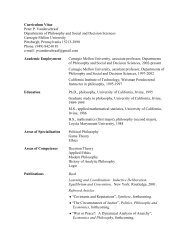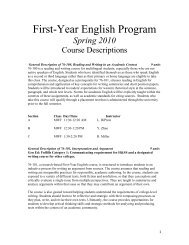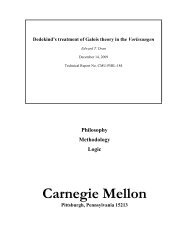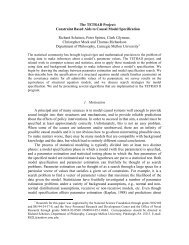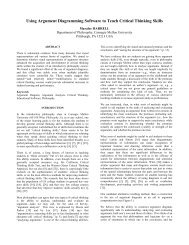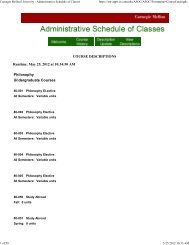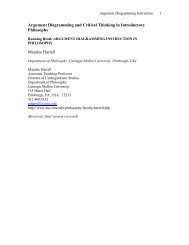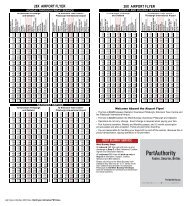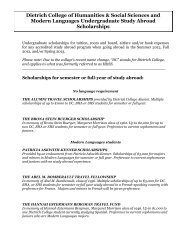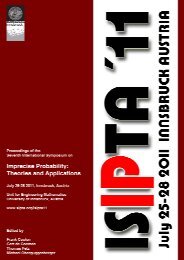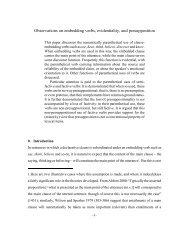Indie Film in Pittsburgh - College of Humanities and Social Sciences ...
Indie Film in Pittsburgh - College of Humanities and Social Sciences ...
Indie Film in Pittsburgh - College of Humanities and Social Sciences ...
Create successful ePaper yourself
Turn your PDF publications into a flip-book with our unique Google optimized e-Paper software.
A production meet<strong>in</strong>g at the Purnell Center for the Arts—Sharon Dilworth, Matt Kopel, Ben Pelman,<br />
<strong>and</strong> Alie Kolb.<br />
<strong>Indie</strong> <strong>Film</strong> <strong>in</strong> <strong>Pittsburgh</strong><br />
The Creative Writ<strong>in</strong>g Department Takes Writ<strong>in</strong>g to the Big Screen<br />
In a production room <strong>in</strong> the Purnell Center for the<br />
Arts, Ben Pelman is try<strong>in</strong>g to get his team’s script<br />
idea about an <strong>in</strong>sane angel across to a circle <strong>of</strong><br />
students. He looks a little frazzled, as if he has<br />
been up all night work<strong>in</strong>g on the current version<br />
<strong>of</strong> his script. Pelman is pitch<strong>in</strong>g his team’s idea,<br />
but the producers aren’t buy<strong>in</strong>g it.<br />
“It’s a religious-based script, with an angel<br />
named Cliff,” says Pelman, us<strong>in</strong>g his h<strong>and</strong>s to<br />
illustrate his po<strong>in</strong>ts. “He seems a little nuts <strong>in</strong> the<br />
eyes <strong>of</strong> the public.”<br />
“Yeah, but what is the movie about?” asks<br />
producer Bob Moczydlowsky. Pelman looks<br />
confused for a moment, <strong>and</strong> Moczydlowsky<br />
expla<strong>in</strong>s: “What we need is log l<strong>in</strong>es <strong>and</strong><br />
treatments, a synopsis <strong>of</strong> the plot that we can use<br />
to sell these films. Otherwise, how are we go<strong>in</strong>g<br />
to get people <strong>in</strong>terested <strong>in</strong> the film?” Everyth<strong>in</strong>g<br />
becomes silent as the twenty-five students <strong>and</strong><br />
two pr<strong>of</strong>essors th<strong>in</strong>k about this. They have to<br />
work together to decide what is the best path for<br />
this film. They have to make this decision now<br />
before they can go any further.<br />
The pressure is <strong>in</strong>tense, but this isn’t<br />
Hollywood: it’s a Video Production class at<br />
Carnegie Mellon. The purpose <strong>of</strong> the class is for<br />
two teams <strong>of</strong> undergraduates to write, design, <strong>and</strong><br />
shoot a film by February, <strong>and</strong> have it completed
y May. Accord<strong>in</strong>g to Sharon Dilworth, the<br />
Creative Writ<strong>in</strong>g pr<strong>of</strong>essor who is a producer <strong>and</strong><br />
creative consultant on the films, the project started<br />
due to an <strong>in</strong>terest <strong>in</strong> filmmak<strong>in</strong>g that she saw<br />
among her students.<br />
“Our Bus<strong>in</strong>ess Manager Danny Josephs, along<br />
with some colleagues <strong>in</strong> the department <strong>and</strong><br />
undergraduate students, made the film Tyrant’s<br />
Kiss,” says Dilworth. “Danny <strong>and</strong> I were good<br />
friends, so I heard about the steps <strong>in</strong> the film <strong>in</strong><br />
great detail. It seemed so <strong>in</strong>terest<strong>in</strong>g <strong>and</strong> so<br />
doable. What impressed me the most was that<br />
they made the film <strong>in</strong> one year for very little<br />
money. I admired the project from start to f<strong>in</strong>ish.”<br />
At the same time, Dilworth saw that many <strong>of</strong><br />
her students were apply<strong>in</strong>g to film school. “The<br />
graduate programs were look<strong>in</strong>g for completed<br />
projects to show that the students could work an<br />
idea from start to f<strong>in</strong>ish,” she says.<br />
As her course came to fruition, Dilworth saw it<br />
as an opportunity to work with pr<strong>of</strong>essors <strong>in</strong> other<br />
departments. She really wanted to work with<br />
Shirley Saldamarco, a pr<strong>of</strong>essor <strong>of</strong> television<br />
production at Carnegie Mellon. “Shirley <strong>and</strong> I had<br />
shared students over the years,” says Dilworth. “I<br />
heard about her, she heard about me. I met her<br />
last year <strong>and</strong> was impressed with the experience<br />
she was giv<strong>in</strong>g the students <strong>in</strong> her production<br />
course. We talked about collaborat<strong>in</strong>g <strong>and</strong> the<br />
idea for the course came to be.”<br />
The two pr<strong>of</strong>essors planned out the course:<br />
Dilworth would be the producer <strong>and</strong> creative<br />
consultant, oversee<strong>in</strong>g the creative writ<strong>in</strong>g aspect<br />
<strong>of</strong> the film; Saldamarco was the executive<br />
producer, <strong>in</strong> charge <strong>of</strong> oversee<strong>in</strong>g production.<br />
With the producers <strong>in</strong> place, all they needed were<br />
scripts to shoot. Dilworth contacted several<br />
different undergraduate writers <strong>in</strong>terested <strong>in</strong><br />
screenwrit<strong>in</strong>g <strong>and</strong> formed two writ<strong>in</strong>g teams: one<br />
<strong>in</strong>cludes Ben Pelman, Matt Kopel, <strong>and</strong> Alie Kolb;<br />
the other <strong>in</strong>cludes Ryan Coon, Deanna Muyle, <strong>and</strong><br />
Brian Leahy.<br />
“I wanted to write the film,” said Pelman. “I<br />
was excited about it because it wasn’t a writ<strong>in</strong>g<br />
workshop, it was actually writ<strong>in</strong>g a film. I would<br />
get to see the whole writ<strong>in</strong>g process, <strong>and</strong> be<br />
<strong>in</strong>volved <strong>in</strong> the production process as well.”<br />
In the spr<strong>in</strong>g <strong>of</strong> 2005, the two teams met with<br />
Dilworth <strong>and</strong> Saldamarco <strong>and</strong> started pitch<strong>in</strong>g<br />
ideas. The pr<strong>of</strong>essors decided which films would<br />
be shot based on what would be the easiest to<br />
shoot, what had the most potential, <strong>and</strong> what<br />
would teach the most <strong>in</strong> class. Dur<strong>in</strong>g the<br />
summer, the writers went through several radical<br />
revisions based on comments from Dilworth <strong>and</strong><br />
Saldamarco. Two films came about through this<br />
process <strong>of</strong> writ<strong>in</strong>g <strong>and</strong> revision: The Book <strong>of</strong> Cliff<br />
(written by Pelman, Kopel, <strong>and</strong> Kolb), about a<br />
man who may be an angel or he may be <strong>in</strong>sane;<br />
<strong>and</strong> Plant X (written by Coon, Muyle, <strong>and</strong> Leahy),<br />
about a road trip on a day <strong>in</strong> <strong>Pittsburgh</strong> when the<br />
buses aren’t runn<strong>in</strong>g. When school began <strong>in</strong> fall<br />
<strong>of</strong> 2005, several graduate students from the He<strong>in</strong>z<br />
Bus<strong>in</strong>ess School signed up to be producers, <strong>and</strong><br />
the writers started work<strong>in</strong>g with them to make<br />
further revisions.<br />
“The two writ<strong>in</strong>g teams are fantastic,” says<br />
Dilworth. “They’ve worked beyond what I have<br />
imag<strong>in</strong>ed. The scripts are now complete, <strong>and</strong> I<br />
love the narratives, the stories <strong>and</strong> what the<br />
students achieved. There was an <strong>in</strong>credible<br />
amount <strong>of</strong> work that went <strong>in</strong>to the scripts. They<br />
met on weekends, <strong>of</strong>ten work<strong>in</strong>g ten hours at a<br />
stretch <strong>in</strong> order to get scenes <strong>in</strong>.”<br />
The screenwrit<strong>in</strong>g process has been hard for the<br />
students, but everyone has enjoyed it. “The<br />
<strong>in</strong>novation process has been long, but our group<br />
has worked together well, all <strong>of</strong> us adapt<strong>in</strong>g to the
notes <strong>and</strong> changes that needed to be made <strong>in</strong> the<br />
script,” says Kopel. “Work<strong>in</strong>g together has given<br />
us sound<strong>in</strong>g boards, which help us ref<strong>in</strong>e the<br />
product more. It can be difficult when ideas<br />
conflict, but never for more than a moment, at<br />
least for us. We seem to have similar creative<br />
streams.”<br />
“The best part has been learn<strong>in</strong>g about<br />
collaboration, work<strong>in</strong>g with other students on the<br />
project,” says Pelman. “It’s been much better<br />
than a workshop.”<br />
Kopel agrees with this. “It really is a lot<br />
different from the creative ref<strong>in</strong>ement <strong>and</strong> process<br />
that you learn <strong>in</strong> a workshop,” he says. “It’s<br />
given me a mechanical underst<strong>and</strong><strong>in</strong>g <strong>of</strong><br />
screenwrit<strong>in</strong>g <strong>and</strong> a start<strong>in</strong>g place for screenplays<br />
<strong>in</strong> the future.”<br />
Pr<strong>of</strong>essor Sharon Dilworth<br />
One can see how the writers <strong>and</strong> the producers<br />
work together by sitt<strong>in</strong>g <strong>in</strong> on the production<br />
meet<strong>in</strong>gs. While the scripts for the two films are<br />
be<strong>in</strong>g developed, the two production teams meet<br />
every week to discuss each other’s drafts <strong>and</strong> give<br />
constructive criticism. This week, the two teams<br />
are sitt<strong>in</strong>g <strong>in</strong> a circle <strong>and</strong> discuss<strong>in</strong>g the latest<br />
version <strong>of</strong> The Book <strong>of</strong> Cliff. Dur<strong>in</strong>g the<br />
discussion, Dilworth <strong>and</strong> Saldamarco toss <strong>in</strong><br />
suggestions <strong>and</strong> helpful ideas, but they let the<br />
writers <strong>and</strong> the producers, the students who will<br />
be shoot<strong>in</strong>g the film, make their own decisions.<br />
The producers are try<strong>in</strong>g to figure out from the<br />
writers what it is that the script is all about: the<br />
writers have a very clear idea <strong>of</strong> what they want to<br />
see on the screen, but the producers are look<strong>in</strong>g<br />
for a plot synopsis to sell the film. As they<br />
discuss the film some more, the writ<strong>in</strong>g team<br />
decides that it is a psychological drama about<br />
truth <strong>and</strong> illusion. The producers <strong>and</strong> the writers<br />
are happy with the results. “This is a great move<br />
forward,” says Moczyldowsky.<br />
These k<strong>in</strong>ds <strong>of</strong> results have made Dilworth very<br />
happy s<strong>in</strong>ce the beg<strong>in</strong>n<strong>in</strong>g <strong>of</strong> the project. “People<br />
warned us that the project would fail,” she says.<br />
“They were assured <strong>of</strong> this because we were<br />
work<strong>in</strong>g with undergraduate writers. But hav<strong>in</strong>g<br />
worked with undergraduate writers for sixteen<br />
years, I knew our skeptics were wrong. The<br />
students have worked together with very little<br />
fight<strong>in</strong>g <strong>and</strong> have someth<strong>in</strong>g everyone is proud to<br />
work with.”<br />
For the Creative Writ<strong>in</strong>g department, this is a<br />
new <strong>and</strong> different k<strong>in</strong>d <strong>of</strong> project. “Writ<strong>in</strong>g is a<br />
solitary <strong>and</strong> lonely bus<strong>in</strong>ess. Screenwrit<strong>in</strong>g is an<br />
ensemble, which is different for writers,” says<br />
Dilworth. “I th<strong>in</strong>k we’re all look<strong>in</strong>g forward to<br />
the next stage <strong>of</strong> the project. Shirley knows what<br />
she’s do<strong>in</strong>g <strong>and</strong> I th<strong>in</strong>k it’s go<strong>in</strong>g to work beyond<br />
our expectations. There are go<strong>in</strong>g to be hurdles<br />
<strong>and</strong> struggles, but everyone on the project is more<br />
determ<strong>in</strong>ed than ever to see the scripts be made<br />
<strong>in</strong>to films.”<br />
Dilworth has been encouraged by the successes<br />
<strong>of</strong> this course, so much that she is start<strong>in</strong>g to plan<br />
for next year. “Now we’re just look<strong>in</strong>g for next<br />
year’s stellar students,” she says.
<strong>Social</strong> Change Through Art<br />
Jane Bernste<strong>in</strong>’s New Documentary Focuses On Disabled Adults<br />
Some writers use their work for <strong>in</strong>formation,<br />
some as therapy, <strong>and</strong> some as pure art. With her<br />
new book, Jane Bernste<strong>in</strong> uses her writ<strong>in</strong>g as an<br />
<strong>of</strong>fensive weapon.<br />
“There are lots <strong>of</strong> entitlements that support the<br />
education <strong>of</strong> a disabled child,” says Bernste<strong>in</strong>.<br />
Bernste<strong>in</strong> has been us<strong>in</strong>g these benefits to support<br />
her younger daughter Rachel Glynn, who was<br />
born with optic-nerve hypoplasia. “When that<br />
child turns twenty-one, all <strong>of</strong> those entitlements<br />
are gone.”<br />
Rachel has turned twenty-two.<br />
Bernste<strong>in</strong> found herself, a widowed mother <strong>of</strong> a<br />
disabled daughter, placed <strong>in</strong> a difficult position;<br />
how could she support her daughter <strong>and</strong> work<br />
full-time as a pr<strong>of</strong>essor at Carnegie Mellon?<br />
Would she have to choose between the daughter<br />
she loved <strong>and</strong> the career that helped support her<br />
daughter? Her experiences <strong>in</strong> this conundrum<br />
<strong>in</strong>spired Bernste<strong>in</strong> to write her next book, about<br />
work<strong>in</strong>g with social services to f<strong>in</strong>d a way to<br />
support her daughter, <strong>in</strong> order to highlight the<br />
problems that developmentally disabled people<br />
have <strong>in</strong> today’s society.<br />
Pr<strong>of</strong>essor Jane Bernste<strong>in</strong><br />
Writ<strong>in</strong>g about her family is familiar territory for<br />
Bernste<strong>in</strong>. She wrote Lov<strong>in</strong>g Rachel, about her<br />
experiences as the mother <strong>of</strong> a developmentally<br />
disabled child, <strong>in</strong> 1991; <strong>and</strong> Bereft: A Sister’s<br />
Story, about her sister’s murder <strong>and</strong> its<br />
repercussions, <strong>in</strong> 2000. Her writ<strong>in</strong>g is known for<br />
its courage <strong>in</strong> illustrat<strong>in</strong>g difficult issues <strong>in</strong> her life<br />
<strong>and</strong> mak<strong>in</strong>g peace with them. She cont<strong>in</strong>ues this<br />
trend <strong>in</strong> her latest book.<br />
From the beg<strong>in</strong>n<strong>in</strong>g, it has been a tense process.<br />
“The social services net that is meant to support<br />
our citizens is gone,” says Bernste<strong>in</strong>. “I didn’t<br />
know if Rachel was go<strong>in</strong>g to get a job, or a house,<br />
<strong>and</strong> I didn’t know if I could work <strong>and</strong> support her<br />
at the same time. The law says that the<br />
government has to give education, but there is<br />
noth<strong>in</strong>g else after that.”<br />
Bernste<strong>in</strong> worked through social services to<br />
f<strong>in</strong>d work <strong>and</strong> hous<strong>in</strong>g for Rachel so that her<br />
daughter could support herself as an adult. The<br />
results were not encourag<strong>in</strong>g. “We were told by<br />
the state <strong>of</strong> Pennsylvania there was no possibility<br />
<strong>of</strong> hous<strong>in</strong>g,” says Bernste<strong>in</strong>. “They said it had to<br />
go to more dire cases. You can’t sue the<br />
government for hous<strong>in</strong>g.”<br />
It has not all been a negative experience.<br />
Rachel was able to f<strong>in</strong>d work through the<br />
developmentally disabled community: she got a<br />
job at Citizen Care T.O.C. <strong>in</strong> McKees Rocks,<br />
Pennsylvania. She lives ten m<strong>in</strong>utes away from<br />
home, work<strong>in</strong>g <strong>and</strong> support<strong>in</strong>g herself, yet still<br />
close to her family.<br />
The project has also allowed Bernste<strong>in</strong> to<br />
become closer to her eldest daughter, Charlotte<br />
Glynn. Charlotte directed a documentary that<br />
corresponds to the book. Bernste<strong>in</strong>’s concept was<br />
that the book would chronicle her own<br />
experiences <strong>in</strong> deal<strong>in</strong>g with social services, <strong>and</strong><br />
the film would capture Rachel’s day-to-day life.<br />
She is plann<strong>in</strong>g for both projects to come out
simultaneously, <strong>and</strong> to be used as tools for<br />
advocacy groups.<br />
Charlotte has done a previous project with<br />
Rachel, a short film made dur<strong>in</strong>g her sophomore<br />
year <strong>in</strong> film school, but she wasn’t certa<strong>in</strong> about<br />
the current project. “Charlotte is more <strong>in</strong>terested<br />
<strong>in</strong> narrative film than <strong>in</strong> documentary,” says<br />
Bernste<strong>in</strong>. “But then she shot some <strong>in</strong>itial footage<br />
<strong>and</strong> realized that she wanted to work on the<br />
project.”<br />
The decid<strong>in</strong>g moment was when Bernste<strong>in</strong><br />
went to Lifeshar<strong>in</strong>g, an assisted liv<strong>in</strong>g facility for<br />
developmentally disabled adults. Charlotte came<br />
along to shoot footage <strong>and</strong> was appalled.<br />
“I was balanc<strong>in</strong>g work <strong>and</strong> family at the time,<br />
<strong>and</strong> was go<strong>in</strong>g along with this adult hous<strong>in</strong>g, but<br />
Charlotte showed me how wrong it all was,” says<br />
Bernste<strong>in</strong>. “Charlotte is twenty-five <strong>and</strong> very<br />
fiery. It’s great to hang out with someone who is<br />
full <strong>of</strong> outrage. It rem<strong>in</strong>ds me that I should have<br />
outrage as well.”<br />
While the project has been about fight<strong>in</strong>g the<br />
system, Bernste<strong>in</strong> loved work<strong>in</strong>g with her<br />
daughters. “As an artist, the project has been<br />
<strong>in</strong>tense,” she says. “Rachel became a family<br />
bus<strong>in</strong>ess. We were follow<strong>in</strong>g her around every<br />
day. It’s also been a great collaborative<br />
experience. I really respect Charlotte as an artist,<br />
<strong>and</strong> I loved the privilege <strong>of</strong> work<strong>in</strong>g with her.<br />
Plus it was a lot <strong>of</strong> fun hav<strong>in</strong>g young artists (the<br />
film crew) work<strong>in</strong>g <strong>in</strong> the house.”<br />
The first draft <strong>of</strong> the book is almost done, <strong>and</strong><br />
Bernste<strong>in</strong> is look<strong>in</strong>g for fund<strong>in</strong>g to complete the<br />
edit<strong>in</strong>g <strong>of</strong> the film. “This film will happen,” says<br />
Bernste<strong>in</strong>. “It won’t be a talk<strong>in</strong>g heads<br />
documentary, but much more artistic. It’s go<strong>in</strong>g<br />
to be great.”<br />
The Epic Poem<br />
Anthony Butts Takes the Poem to New Heights<br />
“Writers must get out more,” says Anthony Butts,<br />
pr<strong>of</strong>essor <strong>in</strong> Carnegie Mellon’s creative writ<strong>in</strong>g<br />
program. “The writ<strong>in</strong>g community is great, but<br />
you must experience more <strong>and</strong> br<strong>in</strong>g that to the<br />
table.”<br />
This is someth<strong>in</strong>g that Butts believes<br />
implicitly. As a poet <strong>and</strong> writer, his work can<br />
never be considered isolated. For example, the<br />
<strong>in</strong>spiration for his latest project, a poem <strong>in</strong> the<br />
epic tradition <strong>of</strong> the Odyssey, came from a<br />
conversation he had with two psychology<br />
pr<strong>of</strong>essors. “They were amazed that there has<br />
never been an epic poem about peace,” says Butts.<br />
“They have always been about war. And s<strong>in</strong>ce I<br />
wanted to write a book length manuscript for my<br />
next poem, it was the perfect idea.”<br />
Pr<strong>of</strong>essor Anthony Butts
An epic about peace is the k<strong>in</strong>d <strong>of</strong> project<br />
that fits perfectly <strong>in</strong>to Butts’s repertoire. He has<br />
always been an <strong>in</strong>novative poet, fus<strong>in</strong>g new<br />
concepts with classic poetic forms. His work has<br />
focused on topics <strong>of</strong> science, religion, <strong>and</strong><br />
<strong>in</strong>ternational war while <strong>in</strong>spired by the styl<strong>in</strong>gs <strong>of</strong><br />
Shakespeare, Keats, <strong>and</strong> Homer. An epic, novel<br />
length poem that contradicts the classic purpose <strong>of</strong><br />
the epic to tell stories about great battles does not<br />
seem unlikely for this poet.<br />
“Perhaps it’s because I started as a premed<br />
student when I was an undergraduate,” he<br />
says, when asked about his <strong>in</strong>spirations as an<br />
artist. “But then I thought that poetry would<br />
accomplish what I wanted to achieve more than<br />
science. I wanted to heal the soul.”<br />
As he worked on his art as a poet, Butts<br />
never ab<strong>and</strong>oned ideas <strong>of</strong> science or social<br />
commentary. In his most recently completed<br />
manuscript, Male Hysteria, which will be<br />
published by Crab Orchard Press, his poems are<br />
focused on freedom <strong>of</strong> speech issues <strong>in</strong> times <strong>of</strong><br />
war, focus<strong>in</strong>g on the Korean War <strong>and</strong> the current<br />
war <strong>in</strong> Iraq. In his previous books Fifth Season<br />
(1997) <strong>and</strong> Little Low Heaven (2003), he has<br />
written poems about gender issues, m<strong>in</strong>ority<br />
issues, the middle class <strong>in</strong> America,<br />
psychoanalysis, <strong>and</strong> astronomy <strong>and</strong> astrophysics.<br />
“Poetry is a k<strong>in</strong>d <strong>of</strong> bridge between<br />
science <strong>and</strong> humanities,” he says. “I want to<br />
counter the idea that only humanities are<br />
subjective. Science is subjective as well, which is<br />
why it changes so <strong>of</strong>ten. There is always<br />
someth<strong>in</strong>g about it that is evolv<strong>in</strong>g.”<br />
While Butts uses his work to challenge<br />
science <strong>and</strong> humanities, he also uses it to discuss<br />
issues that are more personal. His own religious<br />
faith is a major topic <strong>in</strong> his writ<strong>in</strong>g, especially<br />
s<strong>in</strong>ce he converted to Catholicism ten years ago.<br />
“It speaks to me about cont<strong>in</strong>uity, about art <strong>and</strong><br />
the soul,” he says. “I couldn’t help but to do it.”<br />
While he does have a strong faith, he believes that<br />
he must speak out aga<strong>in</strong>st aspects <strong>of</strong> his church<br />
that he does not th<strong>in</strong>k is right. “I attack the<br />
m<strong>in</strong>istry with my poetry, even though I am not<br />
supposed to,” he says. “But I’ve seen so much<br />
hypocrisy <strong>in</strong> religion. Religion is a very personal<br />
th<strong>in</strong>g, <strong>and</strong> yet many people use it to support their<br />
own hang-ups.”<br />
For <strong>in</strong>stance, Butts tells a story that<br />
happened to his sister before her wedd<strong>in</strong>g. “They<br />
met with a m<strong>in</strong>ister who told them that she would<br />
have dozens <strong>of</strong> kids. I thought that was crazy, <strong>and</strong><br />
my mother thought I was blasphemous.” He<br />
smiles sheepishly <strong>and</strong> adds: “I do have a fear <strong>of</strong><br />
be<strong>in</strong>g excommunicated for my poetry!”<br />
Butts writes about issues he does not agree<br />
with but he doesn’t use his work to simply<br />
compla<strong>in</strong>. He tries to come to some k<strong>in</strong>d <strong>of</strong><br />
underst<strong>and</strong><strong>in</strong>g between two different viewpo<strong>in</strong>ts,<br />
like art <strong>and</strong> science, poetry <strong>and</strong> psychoanalysis,<br />
religion <strong>and</strong> true belief. “These times really need<br />
someone to say what they really feel,” says Butts.<br />
“It is the charge <strong>of</strong> the poet to come up with<br />
answers. The poet is a spokesperson. They can’t<br />
just compla<strong>in</strong>.”<br />
As for the future poets, Butts is very<br />
optimistic about his students at Carnegie Mellon.<br />
“I have read the best poetry from students at<br />
Carnegie Mellon,” he says. “They keep ask<strong>in</strong>g<br />
questions, <strong>and</strong> I encourage them to ask more<br />
questions through their writ<strong>in</strong>g.”
Carnegie Mellon University Press: Cynthia Lamb, Senior Editor; Gerald Costanzo, Director; Connie<br />
Amoroso, Graduate Intern<br />
Press<strong>in</strong>g Issues<br />
Gerald Costanzo’s Publish<strong>in</strong>g Experience at Carnegie Mellon University Press<br />
Gerald Costanzo is a difficult man to reach. In<br />
fact, we had to set up three separate appo<strong>in</strong>tments<br />
until we f<strong>in</strong>ally met for this <strong>in</strong>terview, which<br />
shows just how busy the head <strong>of</strong> the Carnegie<br />
Mellon University Press is. When we meet,<br />
Costanzo is very apologetic.<br />
“There are millions <strong>of</strong> details about books,”<br />
says Costanzo. “We are send<strong>in</strong>g seventeen books<br />
to publishers, <strong>and</strong> we want to make sure that they<br />
are error free. It’s a very busy time <strong>of</strong> year.”<br />
He isn’t kidd<strong>in</strong>g. Carnegie Mellon Press has<br />
received several hundred manuscripts from poets<br />
<strong>and</strong> writers from around the world, <strong>and</strong> Costanzo<br />
<strong>and</strong> his staff must sort through all <strong>of</strong> them <strong>in</strong> order<br />
to choose which books they will publish. “We<br />
usually publish twenty books per year,” says<br />
Costanzo.<br />
Costanzo founded Three Rivers Press <strong>in</strong> 1975.<br />
“My first book was published <strong>in</strong> 1975, when I was<br />
28,” says Costanzo. “There were poets I was<br />
read<strong>in</strong>g <strong>in</strong> 1975 who were excellent, who had paid<br />
their dues <strong>in</strong> their late thirties <strong>and</strong> forties <strong>and</strong> who<br />
still had not been published.”<br />
Costanzo began tak<strong>in</strong>g classes <strong>in</strong> the design<br />
department <strong>of</strong> the Pr<strong>in</strong>t Management School at<br />
Carnegie Mellon University, <strong>in</strong>dependent <strong>of</strong> his<br />
teach<strong>in</strong>g. “I started the press from a desire to help<br />
poets <strong>of</strong> my generation, <strong>and</strong> Carnegie Mellon<br />
gave me an opportunity to do that.”<br />
After a conversation with President Richard<br />
Cyert <strong>of</strong> Carnegie Mellon, Costanzo jo<strong>in</strong>ed his<br />
company with the university. Three Rivers <strong>and</strong><br />
Carnegie Mellon became publish<strong>in</strong>g partners, <strong>and</strong><br />
were distributed by the University <strong>of</strong> <strong>Pittsburgh</strong>.<br />
After that, HarperRow distributed the press<br />
publications until they were dropped after a<br />
merger that made HarperRow <strong>in</strong>to HarperColl<strong>in</strong>s.<br />
Now it is distributed by Cornell University Press.<br />
S<strong>in</strong>ce the merger with Carnegie Mellon,<br />
Costanzo’s position as the head <strong>of</strong> the press
ecame a full-time position. “I never anticipated<br />
it becom<strong>in</strong>g a full-time job, s<strong>in</strong>ce I started it as a<br />
hobby,” says Costanzo.<br />
The press has exp<strong>and</strong>ed to <strong>in</strong>clude several<br />
different genres. Even though they still focus on<br />
poetry, they also publish collected short fiction,<br />
edited by Sharon Dilworth, literary criticism,<br />
bus<strong>in</strong>ess texts, art history, <strong>and</strong> even a cookbook.<br />
There is not a unify<strong>in</strong>g form that the books have<br />
to follow. “We’re look<strong>in</strong>g for what we th<strong>in</strong>k <strong>of</strong> as<br />
excellence, books that really adhere to the<br />
university mission <strong>of</strong> scholarship,” says Costanzo.<br />
The publish<strong>in</strong>g house runs with one full time<br />
staff member, assisted by a number <strong>of</strong><br />
undergraduate students. “They are the ones who<br />
are the prime movers,” says Costanzo. “Without<br />
the students <strong>in</strong> edit<strong>in</strong>g <strong>and</strong> publish<strong>in</strong>g we could<br />
not do what we do.”<br />
One <strong>of</strong> the major tasks that the students take on<br />
is choos<strong>in</strong>g several manuscripts from unpublished<br />
authors to publish every year. The students go<br />
through several hundred manuscripts that are<br />
submitted every year <strong>and</strong> f<strong>in</strong>d forty that they meet<br />
with Costanzo to discuss. This year, four<br />
manuscripts were chosen from two hundred <strong>and</strong><br />
fifty to five hundred submissions.<br />
It seems m<strong>in</strong>d-boggl<strong>in</strong>g that four manuscripts<br />
could be chosen to publish from so many, but<br />
Costanzo was very confident <strong>in</strong> his students.<br />
“Last year we had an exceptional group <strong>of</strong><br />
students,” he said. “The students apply the<br />
st<strong>and</strong>ards that they have learned <strong>in</strong> the workshops.<br />
This gives them the chance to see how writers put<br />
together manuscripts. It’s a learn<strong>in</strong>g process for<br />
them as well. When you read that many<br />
manuscripts, about 10% <strong>of</strong> them announce<br />
themselves as publication ready. Students are<br />
able to pick that up really rapidly.”<br />
“What is important is that the press stays<br />
relatively young while I grow older, <strong>and</strong> the<br />
students help with that,” says Costanzo. “They<br />
identify some <strong>of</strong> the younger generation, the one<br />
that is closest to theirs. It’s been a pretty healthy<br />
th<strong>in</strong>g for everyone <strong>in</strong>volved.”<br />
Costanzo has enjoyed runn<strong>in</strong>g the press for the<br />
past thirty-five years. He believes that the best<br />
part <strong>of</strong> the job has been the relationship he has<br />
with his students, especially the ones who go on<br />
<strong>in</strong>to the publish<strong>in</strong>g field. “For me its been<br />
education <strong>of</strong> the most desirable sort; a learn<strong>in</strong>g<br />
process for the students but one which prepares<br />
them not only for a career <strong>in</strong> mak<strong>in</strong>g books but<br />
also prepares them for <strong>in</strong>tellectual aspects that<br />
make them succeed <strong>in</strong> this career. It’s a<br />
tremendous reward <strong>and</strong> one that goes on <strong>and</strong> on.”
Pr<strong>of</strong>essor Jim Daniels at the premier <strong>of</strong> his new film Dumpster at the Melwood Theater<br />
Writ<strong>in</strong>g <strong>and</strong> Images<br />
Jim Daniels’s New Writ<strong>in</strong>g Crosses the Format Barrier to Photography, <strong>Film</strong><br />
Besides writ<strong>in</strong>g new poems <strong>and</strong> stories, teach<strong>in</strong>g<br />
full time at Carnegie Mellon <strong>and</strong> runn<strong>in</strong>g the<br />
Creative Writ<strong>in</strong>g department, Jim Daniels has also<br />
written <strong>and</strong> produced a new film. When asked<br />
how he chooses all these different projects, he<br />
laughs <strong>and</strong> says, “It’s not so much a choice as<br />
they choose me!”<br />
The new film is called Dumpster <strong>and</strong> was shot<br />
on the Carnegie Mellon campus. It’s about a<br />
janitor who discovers a wealthy frat boy liv<strong>in</strong>g <strong>in</strong><br />
a dumpster on the campus <strong>of</strong> an elite university.<br />
Daniels worked with director John Rice <strong>and</strong> actor<br />
David Conrad, a <strong>Pittsburgh</strong> native who is<br />
currently starr<strong>in</strong>g <strong>in</strong> the television show The<br />
Ghost Whisperer. The film premiered at the<br />
<strong>Pittsburgh</strong> <strong>Film</strong> Festival on November 5.<br />
Work<strong>in</strong>g across genres is noth<strong>in</strong>g new to<br />
Daniels. He frequently works with different<br />
artists <strong>in</strong> the <strong>Pittsburgh</strong> area. “I like to reach out<br />
to artists <strong>in</strong> other genres who give me new ideas,”<br />
he says. In fact, he is not the only pr<strong>of</strong>essor <strong>in</strong> the<br />
Creative Writ<strong>in</strong>g department at Carnegie Mellon<br />
who works <strong>in</strong> different genres. “We’re not afraid<br />
to challenge ourselves,” says Daniels.<br />
“Sometimes we fall flat on our faces, but that<br />
<strong>in</strong>forms the next project.”<br />
This isn’t Daniels’s first film. He wrote No<br />
Pets, which started as a one-act play <strong>and</strong> evolved<br />
<strong>in</strong>to a film. He learned a great deal from that<br />
experience about how to make an <strong>in</strong>dependent<br />
movie with little or no budget. “For a low budget<br />
film, you have to be careful how you set it up,<br />
because you don’t have much to work with,” he
says. “With Dumpster, there are only three<br />
sett<strong>in</strong>gs: a frat house, the worker’s house, <strong>and</strong> a<br />
dumpster right by Baker Hall.”<br />
Although it was difficult work<strong>in</strong>g with a very<br />
limited budget, Daniels found that he enjoys<br />
work<strong>in</strong>g on an <strong>in</strong>dependent film. “You build a<br />
sense <strong>of</strong> camaraderie, even when you don’t have<br />
any money,” he says. “You know that it will<br />
never show <strong>in</strong> a multiplex, so you make<br />
someth<strong>in</strong>g that you can be proud <strong>of</strong>.”<br />
Work<strong>in</strong>g on a film has been a great experience<br />
for Daniels <strong>and</strong> his other writ<strong>in</strong>gs. He f<strong>in</strong>ds that<br />
writ<strong>in</strong>g a screenplay has helped his poetry <strong>and</strong><br />
vice versa. Writ<strong>in</strong>g <strong>in</strong> different styles has led<br />
Daniels to us<strong>in</strong>g different techniques <strong>in</strong> his poetry<br />
<strong>and</strong> fiction writ<strong>in</strong>g. “I’ve been us<strong>in</strong>g<br />
simultaneous narratives <strong>in</strong> my poetry, k<strong>in</strong>d <strong>of</strong> like<br />
a jump cut <strong>in</strong> a film,” he says. “Also, film is a<br />
very visual medium, <strong>and</strong> dialogue is essential to<br />
fiction. By work<strong>in</strong>g on a screenplay, it helps me<br />
write better dialogue <strong>in</strong> fiction <strong>and</strong> create better<br />
characters.”<br />
While work<strong>in</strong>g on Dumpster, Daniels also<br />
worked on a project with photographer Charlee<br />
Brodsky, a pr<strong>of</strong>essor <strong>of</strong> photography at Carnegie<br />
Mellon. The show is a series <strong>of</strong> photographs<br />
taken by Brodsky <strong>of</strong> the remnants <strong>of</strong> the steel mill<br />
neighborhoods <strong>in</strong> Homestead, accompanied by<br />
poems by Daniels <strong>and</strong> Creative Writ<strong>in</strong>g pr<strong>of</strong>essor<br />
Jane McCafferty, at the Westmorel<strong>and</strong> Museum.<br />
Daniels <strong>and</strong> Brodsky also recently published a<br />
book entitled Streets, a collection <strong>of</strong> photographs<br />
<strong>of</strong> people on the streets <strong>of</strong> <strong>Pittsburgh</strong>,<br />
accompanied by Daniels’ poems.<br />
Daniels cont<strong>in</strong>ues to produce his own work. He<br />
is currently gather<strong>in</strong>g poems <strong>and</strong> short stories for<br />
a new book. In the meantime, one <strong>of</strong> his new<br />
short stories will be published <strong>in</strong> Nighttra<strong>in</strong><br />
literary magaz<strong>in</strong>e. “It’s a story called United<br />
States Street Football,” says Daniels, “<strong>and</strong> it’s<br />
about a group <strong>of</strong> kids who play football <strong>in</strong> the<br />
street. They mark <strong>of</strong>f their field by writ<strong>in</strong>g USSF<br />
on it.”<br />
Then he smiles. “Well, I could tell you what<br />
happens next, but that would ru<strong>in</strong> the story,” he<br />
says.<br />
The premiere <strong>of</strong> Dumpster was quite a success.<br />
Both shows at the Melwood Screen<strong>in</strong>g Room on<br />
November 5 sold out. Daniels seemed bewildered<br />
after the reception, but very enthused. “This is<br />
really great,” he said. “I saw some people here<br />
who I haven’t seen <strong>in</strong> years.”<br />
When asked if he was ready to make his next<br />
movie, Daniels laughed. “No, not yet. So many<br />
people helped us to make this film, gave us so<br />
many deals so that we could afford to make it, that<br />
I wouldn’t want to impose aga<strong>in</strong>.” Then he<br />
smiled sheepishly. “Then aga<strong>in</strong>, I did start<br />
work<strong>in</strong>g on a new script….”
The Past as Present<br />
Hilary Masters Works His Past Into His Current Writ<strong>in</strong>gs<br />
Hilary Masters’s <strong>of</strong>fice is very comfortable.<br />
There is a leather couch, a huge pr<strong>in</strong>t<strong>in</strong>g <strong>of</strong><br />
multiple images <strong>of</strong> Anton Chekhov, <strong>and</strong>, <strong>of</strong><br />
course, shelves <strong>of</strong> books for perus<strong>in</strong>g. But it’s the<br />
little th<strong>in</strong>gs about an <strong>of</strong>fice that tells you about<br />
who <strong>in</strong>habits it. If you look closely, you will<br />
notice a postcard on his desk advertis<strong>in</strong>g a young<br />
Hilary Masters for public <strong>of</strong>fice <strong>in</strong> the 1950’s. He<br />
doesn’t look much different now as he did then—<br />
wiser, more experienced, which comes from many<br />
years as a publisher, a writer, <strong>and</strong> a teacher at<br />
many universities, <strong>in</strong>clud<strong>in</strong>g Carnegie Mellon.<br />
Pr<strong>of</strong>essor Hilary Masters<br />
When I ask him why he is a writer, he flashes a<br />
disarm<strong>in</strong>g smile <strong>and</strong> says, “I like to tell stories. I<br />
come from a family that tells stories about the<br />
family.” Then he tells a short story about his<br />
gr<strong>and</strong>mother, who worked on the Pendergrast<br />
campaign <strong>in</strong> Kansas City, which was well known<br />
for corruption. Then he goes back to his own<br />
writ<strong>in</strong>g. “It’s the act <strong>of</strong> storytell<strong>in</strong>g, mak<strong>in</strong>g<br />
someth<strong>in</strong>g up from what is <strong>in</strong> my memory or on<br />
the table, that is fasc<strong>in</strong>at<strong>in</strong>g <strong>and</strong> a challenge.”<br />
The challenge <strong>of</strong> storytell<strong>in</strong>g has led Masters to<br />
write n<strong>in</strong>e novels, several books <strong>of</strong> essays <strong>and</strong><br />
memoirs, <strong>and</strong> many articles for literary journals.<br />
His latest novel, Elegy for Sam Emerson, will be<br />
published <strong>in</strong> May. The title character is a chef <strong>in</strong><br />
<strong>Pittsburgh</strong> who grew up <strong>in</strong> East Liverpool, Ohio<br />
<strong>and</strong> New York City. As the novel beg<strong>in</strong>s, he is<br />
try<strong>in</strong>g to figure out what to do with the ashes <strong>of</strong><br />
his recently deceased mother. Throughout the<br />
story, as Sam Emerson faces the issue <strong>of</strong> death, he<br />
keeps runn<strong>in</strong>g <strong>in</strong>to his own past.<br />
“I purposely set the novel before September 11<br />
to eulogize how th<strong>in</strong>gs were, before paranoia <strong>and</strong><br />
radical changes <strong>in</strong> society. I def<strong>in</strong>itely want to<br />
preserve the <strong>in</strong>nocence <strong>of</strong> the time,” says Masters.<br />
“I’ve always been <strong>in</strong>terested <strong>in</strong> one’s past <strong>and</strong><br />
present <strong>and</strong> how they feed <strong>of</strong>f <strong>of</strong> each other.”<br />
The past is an important factor <strong>in</strong> Masters’s<br />
other novels. His novel Shadows on a Wall is<br />
about E.J. Kaufmann hir<strong>in</strong>g muralist Juan<br />
O’Gorman <strong>in</strong> 1940’s <strong>Pittsburgh</strong>. Home is the<br />
Exile is about two soldiers, one <strong>in</strong> the Spanish<br />
Civil War <strong>and</strong> the other <strong>in</strong> the Iran-Contra<br />
sc<strong>and</strong>al, <strong>in</strong> a story about heroism <strong>and</strong> ideals.<br />
Masters even traces his <strong>in</strong>terest <strong>in</strong> the past back<br />
through his family, to his gr<strong>and</strong>father, Tom<br />
Coyne, who was an immigrant from Irel<strong>and</strong> who<br />
was obsessed with the past; <strong>and</strong> to his father,<br />
Edgar Lee Masters, a writer known for writ<strong>in</strong>g<br />
Spoon River Anthology <strong>in</strong> 1915. Masters wrote<br />
about their lives <strong>in</strong> Last St<strong>and</strong>s: Notes From<br />
Memory, a memoir that covers over a hundred
years <strong>of</strong> history through his father <strong>and</strong><br />
gr<strong>and</strong>father.<br />
S<strong>in</strong>ce the past is such an important part <strong>of</strong><br />
Masters’s art, it only makes sense that his latest<br />
novel is one that he wrote thirty years ago. “My<br />
wife found it while pok<strong>in</strong>g around <strong>in</strong> a trunk,” he<br />
says. “I’ve been work<strong>in</strong>g on it ever s<strong>in</strong>ce, mak<strong>in</strong>g<br />
corrections <strong>and</strong> typ<strong>in</strong>g it <strong>in</strong>to my hard drive.”<br />
The novel was written from 1974 to 1975, <strong>and</strong><br />
is very different from his other work. “It’s a postapocalyptic<br />
novel set at a castle called<br />
Ballerman’s Isl<strong>and</strong> <strong>in</strong> the Hudson River,” says<br />
Masters. “There’s no real plot to it. It’s really<br />
about a bunch <strong>of</strong> people gett<strong>in</strong>g together <strong>and</strong><br />
tell<strong>in</strong>g stories. The stories are about love, trust,<br />
honor, <strong>and</strong> belief <strong>in</strong> language. It’s very cerebral.”<br />
Then Masters laughs. “I don’t know what I’m<br />
go<strong>in</strong>g to do with it!” he says.<br />
Cont<strong>in</strong>u<strong>in</strong>g the Tradition <strong>of</strong><br />
Mart<strong>in</strong> Luther K<strong>in</strong>g, Jr.<br />
By Kather<strong>in</strong>e Qu<strong>in</strong>n Tyler<br />
How many people take the time to remember the<br />
man beh<strong>in</strong>d the federal holiday when January 17 th<br />
rolls around? How many people sleep <strong>in</strong>, watch<br />
daytime TV <strong>and</strong> never once pause to th<strong>in</strong>k about<br />
the struggles <strong>and</strong> sacrifices <strong>of</strong> the fallen civil<br />
rights leader? At Carnegie Mellon we remember<br />
<strong>and</strong> the Creative Writ<strong>in</strong>g Department encourages<br />
others <strong>in</strong> the community to do the same.<br />
The Mart<strong>in</strong> Luther K<strong>in</strong>g, Jr. Writ<strong>in</strong>g Awards<br />
have been held to commemorate this occasion for<br />
six years. The contest was founded by Jim<br />
Daniels, pr<strong>of</strong>essor <strong>and</strong> director <strong>of</strong> the Creative<br />
Writ<strong>in</strong>g program.<br />
Race has been a central issue <strong>in</strong> Daniel’s life,<br />
hav<strong>in</strong>g grown up <strong>in</strong> the racially-divided city <strong>of</strong><br />
Detroit. After compil<strong>in</strong>g Letters to America:<br />
Contemporary American Poetry on Race, an<br />
anthology <strong>of</strong> poetry on this controversial subject,<br />
he was <strong>in</strong>spired to found a contest based on the<br />
same idea. Daniels sought to, “br<strong>in</strong>g people<br />
together to talk about the subject that so <strong>of</strong>ten<br />
divides us,” he said.<br />
With every pass<strong>in</strong>g year, the contest has grown<br />
bigger <strong>and</strong> more successful. This year the<br />
Creative Writ<strong>in</strong>g Department received<br />
submissions from local high schools <strong>and</strong> Carnegie<br />
Mellon. Students competed <strong>in</strong> two categories:<br />
poetry <strong>and</strong> prose (fiction or nonfiction) for cash<br />
prizes <strong>and</strong> the opportunity to read their work<br />
dur<strong>in</strong>g the university’s celebration <strong>of</strong> the life <strong>of</strong><br />
Dr. K<strong>in</strong>g.<br />
On Mart<strong>in</strong> Luther K<strong>in</strong>g, Jr. Day, 17 students<br />
proudly read their honored writ<strong>in</strong>g <strong>in</strong> front <strong>of</strong> a<br />
large audience <strong>in</strong> Rangos Hall. No two pieces<br />
were alike, each student shared a personal<br />
experience with race, rem<strong>in</strong>d<strong>in</strong>g the audience that<br />
physical <strong>and</strong> social differences cont<strong>in</strong>ue to<br />
divide us.<br />
One <strong>of</strong> the most poignant <strong>and</strong> relevant read<strong>in</strong>gs<br />
was by Kami Smith. Tak<strong>in</strong>g home the 2 nd place <strong>in</strong><br />
poetry for Carnegie Mellon, Kami’s The<br />
Discovery <strong>of</strong> the Article…was written <strong>in</strong> response<br />
to the Natrat controversy <strong>of</strong> 2004. Traditionally<br />
for April Fool’s Day the writers at the Tartan<br />
publish a farcical issue <strong>of</strong> the school paper, but<br />
last year’s issue <strong>of</strong>fended more than it amused. At<br />
the heart <strong>of</strong> the campus outrage was a comic<br />
featur<strong>in</strong>g a racial slur. Kami f<strong>in</strong>ishes her poem<br />
with these words:
“If you believe that we’re divid<strong>in</strong>g by look<strong>in</strong>g at how far we’ve come,<br />
You are sadly mistaken because we are a nation <strong>of</strong> all people<br />
But there are still <strong>in</strong>justices <strong>in</strong> this world on both sides<br />
Which I am not excus<strong>in</strong>g, but<br />
We should all be able to look back at our history, every group,<br />
Because the existence <strong>of</strong> this time <strong>and</strong> <strong>of</strong> this month<br />
Is not only for me to reflect on, but also a learn<strong>in</strong>g experience<br />
For you, but apparently, this fact stopped, checked you out, <strong>and</strong> rolled right on past.<br />
And for this, I pity your ignorance.”<br />
The f<strong>in</strong>al read<strong>in</strong>g at the awards ceremony was<br />
Oreo, by Patrice Desirae Alex<strong>and</strong>er, a high school<br />
student from W<strong>in</strong>chester Thurston. She writes,<br />
“I th<strong>in</strong>k about the long battle Mart<strong>in</strong> Luther<br />
K<strong>in</strong>g, Jr. fought to achieve civil rights for people.<br />
I believe that we live <strong>in</strong> a nation today where<br />
people aren’t judged by the color <strong>of</strong> their sk<strong>in</strong>, but<br />
by the content <strong>of</strong> their characters. Strong,<br />
determ<strong>in</strong>ed people break the racist stereotypes <strong>of</strong><br />
the past every day. We live <strong>in</strong> a nation today<br />
where people can do whatever they want to do<br />
with their lives <strong>and</strong> become whatever they desire<br />
to become if they are will<strong>in</strong>g to meet the<br />
<strong>in</strong>tellectual requirements <strong>of</strong> their dest<strong>in</strong>y <strong>and</strong><br />
society. Even if I can only change one person’s<br />
perspective at a time, I won’t stop do<strong>in</strong>g so until<br />
everyone believes <strong>in</strong> opportunity.”<br />
The ceremony demonstrated that the legacy <strong>of</strong><br />
Mart<strong>in</strong> Luther K<strong>in</strong>g, Jr. has not been forgotten.<br />
Dr. K<strong>in</strong>g brought a message <strong>of</strong> hope to all the<br />
people he touched <strong>and</strong> that message cont<strong>in</strong>ues to<br />
resonate <strong>in</strong> the future leaders <strong>of</strong> this country.
News at 11:00<br />
Carnegie Mellon Graduate Sonni Abatta<br />
Tells Stories Every Morn<strong>in</strong>g on KDKA<br />
KDKA News Anchor Sonni Abatta<br />
Even <strong>in</strong> the middle <strong>of</strong> a conversation, Sonni<br />
Abatta always seems to be watch<strong>in</strong>g the room.<br />
Even as she sits <strong>and</strong> answers the questions for this<br />
<strong>in</strong>terview, she is listen<strong>in</strong>g to conversations that go<br />
on around her <strong>in</strong> the c<strong>of</strong>fee shop, or watch<strong>in</strong>g as<br />
people come <strong>in</strong> <strong>and</strong> go out <strong>and</strong> order cappucc<strong>in</strong>os.<br />
It’s not that she’s try<strong>in</strong>g to eavesdrop; she is<br />
always <strong>in</strong>terested <strong>in</strong> stories. It’s part <strong>of</strong> her job.<br />
As an anchor <strong>and</strong> reporter for KDKA, Abatta’s<br />
work is always about captur<strong>in</strong>g the story. For the<br />
morn<strong>in</strong>g show, she writes her own material for her<br />
slot as an anchor on the morn<strong>in</strong>g newscast. Then<br />
<strong>in</strong> the afternoon she’s a reporter, pitch<strong>in</strong>g ideas for<br />
the even<strong>in</strong>g show, putt<strong>in</strong>g them together, writ<strong>in</strong>g<br />
the story, then go<strong>in</strong>g out with a crew <strong>and</strong> film<strong>in</strong>g<br />
it. Abatta is writ<strong>in</strong>g her own material <strong>and</strong><br />
appear<strong>in</strong>g on television twice a day, every day,<br />
which might seem daunt<strong>in</strong>g for a writer. But<br />
Abatta takes it <strong>in</strong> stride.<br />
“It’s not about be<strong>in</strong>g <strong>in</strong> front <strong>of</strong> the camera, it’s<br />
appreciat<strong>in</strong>g the story,” she says. “I enjoy<br />
captur<strong>in</strong>g someone else’s story. Sometimes one<br />
<strong>and</strong> a half m<strong>in</strong>utes isn’t enough, but it’s still<br />
great.”<br />
Abatta has been follow<strong>in</strong>g stories on television<br />
ever s<strong>in</strong>ce high school, when she was a writer for<br />
the high school sports show <strong>in</strong> Rob<strong>in</strong>son<br />
Township. While a sports writer, Abatta<br />
discovered the aspects <strong>of</strong> journalism that she<br />
really enjoyed--writ<strong>in</strong>g, talk<strong>in</strong>g to people, pitch<strong>in</strong>g<br />
ideas, <strong>and</strong> deliver<strong>in</strong>g <strong>in</strong>formation. She was drawn<br />
<strong>in</strong>to writ<strong>in</strong>g for television journalism, even though<br />
she was shy <strong>in</strong> school. “I always enjoyed do<strong>in</strong>g it<br />
<strong>in</strong> school because it made me get out <strong>of</strong> my<br />
comfort zone,” she says.<br />
When she came to Carnegie Mellon University,<br />
she went <strong>in</strong>to creative writ<strong>in</strong>g, where she took<br />
screenwrit<strong>in</strong>g, novel writ<strong>in</strong>g, workshops, <strong>and</strong><br />
journalism courses, which “consists <strong>of</strong> my only<br />
journalism tra<strong>in</strong><strong>in</strong>g <strong>in</strong> college,” says Abatta. All<br />
<strong>of</strong> the creative writ<strong>in</strong>g classes Abatta took were<br />
her favorites at Carnegie Mellon. “The way you<br />
write says a lot about you,” she says. “I wasn’t<br />
great at novel writ<strong>in</strong>g, but I really liked short story<br />
writ<strong>in</strong>g. There is a certa<strong>in</strong> gratification <strong>in</strong><br />
complet<strong>in</strong>g a piece <strong>in</strong> one day.”<br />
She also took f<strong>in</strong>e arts classes—voice,<br />
movement, <strong>and</strong> direction—that helped her<br />
become more confident <strong>in</strong> front <strong>of</strong> the camera.<br />
“It’s a different feel<strong>in</strong>g when you know what you<br />
are talk<strong>in</strong>g about is real,” says Abatta. “You<br />
know you’re not perform<strong>in</strong>g, but you also know<br />
that you are <strong>in</strong> front <strong>of</strong> thous<strong>and</strong>s <strong>of</strong> people. The<br />
classes really helped!”<br />
While at Carnegie Mellon, Abatta did<br />
<strong>in</strong>ternships at on-l<strong>in</strong>e magaz<strong>in</strong>es, at Datel<strong>in</strong>e<br />
NBC, <strong>and</strong> two <strong>in</strong>ternships at KDKA <strong>in</strong> <strong>Pittsburgh</strong>,<br />
<strong>in</strong> the sports <strong>and</strong> news departments. As her<br />
second <strong>in</strong>ternship came to an end, she put together<br />
an audition tape to shop around at other stations<br />
around the country. She gave it to people at<br />
KDKA for a critique, <strong>and</strong> wound up with a job<br />
<strong>of</strong>fer.<br />
“I th<strong>in</strong>k I just had a lot <strong>of</strong> luck. There were a<br />
lot <strong>of</strong> people who were will<strong>in</strong>g to take a chance on<br />
me,” says Abatta. “And for that I am very<br />
grateful.”
Abatta started at KDKA two weeks after her<br />
graduation from Carnegie Mellon. She spent six<br />
months shadow<strong>in</strong>g reporters, watch<strong>in</strong>g how they<br />
prepared their stories. Once her supervisors felt<br />
that she had grown enough, they started her <strong>in</strong> the<br />
weather department <strong>and</strong> a fill-<strong>in</strong> anchor. After<br />
about a year she dropped weather to become an<br />
anchor on the KDKA Morn<strong>in</strong>g Show, <strong>and</strong> a<br />
reporter for the even<strong>in</strong>g shows.<br />
As an anchor <strong>and</strong> a reporter, Abatta puts her<br />
objective writ<strong>in</strong>g skills to use every day. While<br />
she still enjoys writ<strong>in</strong>g fiction, she likes to focus<br />
more on chronicl<strong>in</strong>g, which fits perfectly <strong>in</strong> her<br />
job as a TV news anchor. “The best part <strong>of</strong> the<br />
job is that I get to talk to people for a liv<strong>in</strong>g,” she<br />
says. “I meet different people <strong>in</strong> different<br />
circumstances. Be<strong>in</strong>g a writer I can appreciate<br />
people’s stories. You never know where you will<br />
end up.”<br />
Carnegie Mellon Graduate <strong>and</strong> UPMC Nurse Meg Burke<br />
Hospital Stories<br />
Carnegie Mellon Graduate Meg Burke Works Writ<strong>in</strong>g Into Hospital Career<br />
Writ<strong>in</strong>g has been, <strong>and</strong> always will be, an<br />
important part <strong>of</strong> Meg Burke’s life. Even though<br />
she works as a nurse, she always f<strong>in</strong>ds way to<br />
work writ<strong>in</strong>g <strong>in</strong>to her career. “I’m always<br />
walk<strong>in</strong>g along <strong>and</strong> observ<strong>in</strong>g, <strong>and</strong> see<strong>in</strong>g th<strong>in</strong>gs<br />
that might make a great story,” she says. “I look<br />
for the unpolished sides <strong>of</strong> people; the sides that<br />
people don’t want you to see. That makes great<br />
poems <strong>and</strong> characters.”<br />
Burke is a rare person <strong>in</strong> the world <strong>of</strong> English<br />
studies—she graduated from Carnegie Mellon<br />
with a degree <strong>in</strong> Creative Writ<strong>in</strong>g <strong>in</strong> 1998 <strong>and</strong><br />
went on to University <strong>of</strong> <strong>Pittsburgh</strong> Medical<br />
School with a degree <strong>in</strong> nurs<strong>in</strong>g <strong>in</strong> 2003. Go<strong>in</strong>g<br />
from writ<strong>in</strong>g poetry to pr<strong>of</strong>essional nurs<strong>in</strong>g might<br />
seem like quite a leap, but for Burke, it wasn’t<br />
that difficult. “I have always been fasc<strong>in</strong>ated by<br />
the human body,” says Burke. “My dad bought<br />
me an <strong>in</strong>visible woman when I was little. You<br />
could look right through it <strong>and</strong> see all the guts <strong>and</strong><br />
watch biological processes. It was gross, but very<br />
cool.”
Burke has always had an <strong>in</strong>terest <strong>in</strong> what goes<br />
on beneath the surface: both <strong>in</strong> anatomy <strong>and</strong> <strong>in</strong><br />
hearts <strong>and</strong> souls <strong>of</strong> people around her. She<br />
doesn’t seem that k<strong>in</strong>d <strong>of</strong> person—dur<strong>in</strong>g the<br />
<strong>in</strong>terview she is very personable <strong>and</strong> outgo<strong>in</strong>g—<br />
but she says happily, “I’ve always liked gritty,<br />
ugly writ<strong>in</strong>g. It’s so different from my life.<br />
Writ<strong>in</strong>g always comes from someone’s<br />
experience. When I read someth<strong>in</strong>g like this, I<br />
know that it’s out there, <strong>and</strong> this is fasc<strong>in</strong>at<strong>in</strong>g to<br />
me.”<br />
Her <strong>in</strong>terest <strong>in</strong> the darker side <strong>of</strong> literature is<br />
reflected <strong>in</strong> her favorite authors. “I’ve always<br />
liked Sylvia Plath. Richard Wilbur’s ‘The Writer’<br />
is the most beautiful poem ever. Joyce Carol<br />
Oates—I like that she writes across all genres;<br />
poetry, novels, essays. And Wally Lamb edited a<br />
collection <strong>of</strong> short stories about women <strong>in</strong> prison.<br />
There were so many similar th<strong>in</strong>gs <strong>in</strong> their lives,<br />
<strong>and</strong> to see how this led them <strong>in</strong>to prison was<br />
totally fasc<strong>in</strong>at<strong>in</strong>g.”<br />
Burke was <strong>in</strong>terested <strong>in</strong> writ<strong>in</strong>g <strong>and</strong> literature<br />
from a very young age. She used to write stories<br />
as a little girl <strong>and</strong> enterta<strong>in</strong>ed her parents with<br />
them. In high school, she became more focused<br />
on read<strong>in</strong>g literature <strong>and</strong> took AP English courses.<br />
She started as an English major at Dick<strong>in</strong>son<br />
University, but then discovered the writ<strong>in</strong>g<br />
program at Carnegie Mellon. “I loved<br />
everyth<strong>in</strong>g—the campus, the size <strong>of</strong> the school,<br />
the program, the location,” says Burke. Dur<strong>in</strong>g<br />
her studies, she leaned away from the fiction<br />
workshops towards poetry. “I have a natural<br />
tendency towards poetry,” says Burke. “I like<br />
how short poetry is. It’s that you get to fit as<br />
much as possible <strong>in</strong>to a small package. The thrill<br />
is <strong>in</strong> look<strong>in</strong>g for just the right word.”<br />
As an undergrad, Burke worked at the Carnegie<br />
Mellon Press, <strong>and</strong> dur<strong>in</strong>g her senior year she ran<br />
the student read<strong>in</strong>g series. Dur<strong>in</strong>g one <strong>of</strong> the<br />
student read<strong>in</strong>gs, she met Paul Burke, her future<br />
husb<strong>and</strong>. They have been together ever s<strong>in</strong>ce.<br />
After graduation <strong>in</strong> 1998, Burke <strong>and</strong> her husb<strong>and</strong><br />
moved to Aust<strong>in</strong>, Texas, <strong>and</strong> worked at Trilogy<br />
S<strong>of</strong>tware Corporation for a year, where they<br />
designed recruitment materials, but decided to<br />
return to <strong>Pittsburgh</strong> to be closer to family.<br />
After return<strong>in</strong>g to <strong>Pittsburgh</strong>, Burke decided to<br />
follow her other <strong>in</strong>terests <strong>and</strong> began look<strong>in</strong>g <strong>in</strong>to<br />
medical school. “I always wanted to work <strong>in</strong> a<br />
field where I can help people <strong>and</strong> communicate<br />
with them,” says Burke. “Trilogy S<strong>of</strong>tware didn’t<br />
give me that at all. But I thought that nurs<strong>in</strong>g<br />
would.” She applied to the University <strong>of</strong><br />
<strong>Pittsburgh</strong> <strong>and</strong> was accepted; she graduated <strong>in</strong><br />
2003, <strong>and</strong> began work<strong>in</strong>g at the Shadyside<br />
Medical Center.<br />
Even though she went for a nurs<strong>in</strong>g degree, she<br />
is glad that she did her undergraduate degree <strong>in</strong><br />
creative writ<strong>in</strong>g. “The degree teaches you how to<br />
communicate. There’s a lot <strong>of</strong> that from day to<br />
day. You have to be a liaison between doctors<br />
<strong>and</strong> patients, family, etc. You must be<br />
knowledgeable <strong>and</strong> able to communicate, <strong>and</strong> to<br />
form trust.”<br />
Communication <strong>and</strong> trust are two th<strong>in</strong>gs that<br />
Burke uses the most <strong>in</strong> her work. She looks after<br />
an average <strong>of</strong> five patients per day, <strong>and</strong> must<br />
communicate not only with them, but also with<br />
their family members. She f<strong>in</strong>ds that these are the<br />
people she has to communicate with the most; to<br />
act as a k<strong>in</strong>d <strong>of</strong> impromptu teacher, teach<strong>in</strong>g them<br />
how to care for their surgical wounds, how to take<br />
their medic<strong>in</strong>es, <strong>and</strong> how to h<strong>and</strong>le diseases. “It’s<br />
like teach<strong>in</strong>g on an <strong>in</strong>formal level,” says Burke.<br />
Burke also supervises nurs<strong>in</strong>g students, a<br />
position that she was <strong>in</strong> herself not long ago.<br />
With her experiences <strong>in</strong> creative writ<strong>in</strong>g, she f<strong>in</strong>ds<br />
that she is very good at it. “I never really wanted<br />
to go <strong>in</strong>to teach<strong>in</strong>g, but I really like it,” she says.<br />
“I like to be approachable for the students, <strong>and</strong> to<br />
help them learn their jobs.”<br />
After her career choice, the obvious question is<br />
whether Burke regrets her undergraduate degree.<br />
The answer is: not at all “You’d be amazed at<br />
how many Creative Writ<strong>in</strong>g majors go on to<br />
medical pr<strong>of</strong>essions,” she says. “Three friends <strong>of</strong><br />
m<strong>in</strong>e from my class all went on to medical<br />
careers, not just me. I don’t th<strong>in</strong>k it was a<br />
mistake. I know that I will always use it.”
Seven Best Decisions I Made as a Writer<br />
By Sue Stauffacher<br />
Choos<strong>in</strong>g Carnegie Mellon over New York<br />
University’s undergraduate School <strong>of</strong><br />
Dramatic Writ<strong>in</strong>g.<br />
The longer I am a writer, the more I realize that<br />
whatever good writ<strong>in</strong>g we have to <strong>of</strong>fer the world<br />
is drawn out <strong>of</strong> us. Choos<strong>in</strong>g a more <strong>in</strong>timate <strong>and</strong><br />
personal program was much better for my<br />
development. Hav<strong>in</strong>g teachers like Lynne Barrett,<br />
Jim Daniels, Erw<strong>in</strong> Ste<strong>in</strong>berg, <strong>and</strong> Dave Demarest<br />
gave me the best models for narrative <strong>and</strong> poetry,<br />
academic writ<strong>in</strong>g <strong>and</strong> journalism, while <strong>of</strong>fer<strong>in</strong>g<br />
me the space to experiment.<br />
F<strong>in</strong>d<strong>in</strong>g the Right Life Partner<br />
If I had to choose just one ‘best decision,’ this one<br />
would be it. I fell <strong>in</strong> love with Roger Gilles’s<br />
writ<strong>in</strong>g <strong>in</strong> a junior-level workshop <strong>and</strong> remember<br />
hop<strong>in</strong>g fervently that he did not look like a troll<br />
(sadly, the last guy’s writ<strong>in</strong>g I’d fallen <strong>in</strong> love<br />
with did). Fortunately for me, Roger was very<br />
nice to look at. But more importantly, he has<br />
been absolutely critical <strong>in</strong> any success I can claim<br />
as a writer: a calm, steady, wickedly funny <strong>and</strong><br />
encourag<strong>in</strong>g presence <strong>in</strong> my life. We married <strong>in</strong><br />
1985, <strong>and</strong> both headed to the MFA Program at the<br />
University <strong>of</strong> Arizona. Roger decided to go on to<br />
get a Ph.D. <strong>and</strong> is now a pr<strong>of</strong>essor <strong>in</strong> the Writ<strong>in</strong>g<br />
Department at Gr<strong>and</strong> Valley State University.<br />
Always supportive <strong>of</strong> my struggles to be<br />
published, Roger calls me his retirement<br />
<strong>in</strong>vestment, <strong>and</strong> I call him a great patron <strong>of</strong> the<br />
arts.<br />
Hav<strong>in</strong>g Children<br />
Simply put, my children have taught me more<br />
about what it means to be human—<strong>and</strong> therefore<br />
enriched my writ<strong>in</strong>g <strong>and</strong> my life—than I could<br />
have imag<strong>in</strong>ed. Like the best <strong>of</strong> teachers, they<br />
have drawn out whatever good we possessed <strong>and</strong><br />
nurtured it (while lay<strong>in</strong>g waste to our schedules,<br />
our bank account, <strong>and</strong> our favorite former pastime<br />
<strong>of</strong> ly<strong>in</strong>g around the house <strong>and</strong> read<strong>in</strong>g).<br />
Choos<strong>in</strong>g to Write for Young People<br />
In my MFA program, writ<strong>in</strong>g for young people<br />
was considered a genre <strong>and</strong> so was not allowed.<br />
Look<strong>in</strong>g back, I always want to laugh about this<br />
because, <strong>in</strong> today’s publish<strong>in</strong>g milieu, “Catcher <strong>in</strong><br />
the Rye” would be considered a young adult<br />
novel. So, too, would “To Kill a Mock<strong>in</strong>gbird,”<br />
“The Heart is a Lonely Hunter,” “Oliver Twist”<br />
<strong>and</strong> “Rob<strong>in</strong>son Crusoe.” There is not nearly as<br />
much drama <strong>in</strong> New York surround<strong>in</strong>g children’s<br />
publish<strong>in</strong>g, though Harry Potter may have<br />
changed all that. Drama <strong>and</strong> pr<strong>of</strong>its are<br />
<strong>in</strong>extricably bound. But <strong>in</strong> our completely bizarre<br />
bus<strong>in</strong>ess, I have a very traditional relationship<br />
with my editors at Knopf. I have just completed<br />
my fourth revision <strong>of</strong> my latest novel. This k<strong>in</strong>d<br />
<strong>of</strong> edit<strong>in</strong>g attention is rare today, <strong>and</strong> as I am the<br />
sort <strong>of</strong> writer whose manuscripts are wild <strong>and</strong><br />
rough, I’m very fortunate that editors like this still<br />
exist.<br />
Becom<strong>in</strong>g a Book Reviewer<br />
In addition to giv<strong>in</strong>g me thous<strong>and</strong>s <strong>of</strong> free books,<br />
be<strong>in</strong>g a book reviewer has been like tak<strong>in</strong>g a<br />
master class <strong>in</strong> publish<strong>in</strong>g. There is no ladder to<br />
becom<strong>in</strong>g a published author. We’re just thrown<br />
out there <strong>and</strong> told to go for it. Unless you go to<br />
New York or L.A. <strong>and</strong> beg<strong>in</strong> work<strong>in</strong>g <strong>in</strong> some<br />
entry-level capacity at a production company or<br />
publisher, you simply write <strong>and</strong> submit, almost<br />
like launch<strong>in</strong>g your manuscript over the side <strong>of</strong> a<br />
ship <strong>in</strong> a bottle. Will it ever be read? As a book<br />
reviewer <strong>and</strong> journalist, I <strong>in</strong>terviewed countless<br />
authors, editors, publicists, <strong>and</strong> bookstore owners.
I began to underst<strong>and</strong> the how <strong>and</strong> why <strong>of</strong> the<br />
bus<strong>in</strong>ess. It was immensely helpful.<br />
Read<strong>in</strong>g Viktor Frankl<br />
In the preface to the 1992 edition <strong>of</strong> “Man’s<br />
Search for Mean<strong>in</strong>g,” Victor Frankl talks about<br />
the phenomenal success <strong>of</strong> the book <strong>and</strong> how he<br />
never <strong>in</strong>tended this to be the work that made him<br />
famous. He actually wanted it to be published<br />
anonymously. He goes on to say, “Aga<strong>in</strong> <strong>and</strong><br />
aga<strong>in</strong>, I therefore admonish my students both <strong>in</strong><br />
Europe <strong>and</strong> <strong>in</strong> America: ‘Don’t aim at success—<br />
the more you aim at it <strong>and</strong> make it a target, the<br />
more you are go<strong>in</strong>g to miss it. For success, like<br />
happ<strong>in</strong>ess, cannot be pursued; it must ensue, <strong>and</strong><br />
it only does so as the un<strong>in</strong>tended side-effect <strong>of</strong><br />
one’s dedication to a cause greater than oneself.”<br />
Frankl’s words sparked <strong>in</strong> me the realization that<br />
writ<strong>in</strong>g is less about what we want than what life<br />
wants from us. Writ<strong>in</strong>g is about the passion to<br />
express, about the deep certa<strong>in</strong>ty that you are<br />
called to do someth<strong>in</strong>g. Once I knew that—<strong>and</strong> I<br />
mean really knew it—the worry about what would<br />
or would not happen to my publish<strong>in</strong>g career<br />
began to abate.<br />
Hav<strong>in</strong>g a Mid-Life Crisis<br />
Mid-life crises can be useful. As usual, I wanted<br />
to be first <strong>and</strong> so had m<strong>in</strong>e <strong>in</strong> my late thirties. I’d<br />
gone ten years s<strong>in</strong>ce my first book was published<br />
<strong>and</strong> decided that, perhaps, the universe was try<strong>in</strong>g<br />
to give me a h<strong>in</strong>t. So I ab<strong>and</strong>oned writ<strong>in</strong>g for two<br />
years <strong>and</strong> took a full-time job <strong>in</strong> which I<br />
experienced the pr<strong>of</strong>ound joy <strong>of</strong> earn<strong>in</strong>g a regular<br />
paycheck. The job was creative, flexible <strong>and</strong> fun.<br />
But I was close to miserable. One week before<br />
September 11, 2001, I quit my job <strong>and</strong> decided<br />
that even if I had to self-publish my novels, I was<br />
go<strong>in</strong>g to write one just for myself. Six months<br />
later I sold that book, “Donuthead,” to Knopf,<br />
now a division <strong>of</strong> R<strong>and</strong>om House. The result <strong>of</strong><br />
follow<strong>in</strong>g my <strong>in</strong>st<strong>in</strong>cts without regard to what is<br />
wise, publishable or pr<strong>of</strong>itable has resulted <strong>in</strong> five<br />
more book contracts.<br />
Sue Stauffacher (H&SS, ’83) is the author <strong>of</strong> three<br />
novels <strong>and</strong> a collection <strong>of</strong> folktales. She is<br />
married to Roger Gilles (H&SS, ’83). They live <strong>in</strong><br />
Gr<strong>and</strong> Rapids, Michigan, with their two sons,<br />
Max <strong>and</strong> Walter. You can learn more about Sue<br />
<strong>and</strong> her books at www.suestauffacher.com<br />
How Personal Crisis Begat No Tell Motel<br />
By Reb Liv<strong>in</strong>gston<br />
Discouragement <strong>and</strong> general malaise almost<br />
prevented me from <strong>in</strong>itiat<strong>in</strong>g what is probably my<br />
most enrich<strong>in</strong>g project to date. I always wanted to<br />
start a literary journal, but every time I considered<br />
embark<strong>in</strong>g on such a project, the damn<strong>in</strong>g voice <strong>in</strong><br />
my head would say, “Do we really need another<br />
literary journal?” It’s a fair question; there are<br />
thous<strong>and</strong>s <strong>of</strong> literary journals, the majority with<br />
m<strong>in</strong>iscule readerships. Another issue to consider<br />
was “what could I <strong>of</strong>fer that wasn’t already be<strong>in</strong>g<br />
<strong>of</strong>fered?”<br />
After complet<strong>in</strong>g my MFA at Benn<strong>in</strong>gton <strong>in</strong><br />
2001, I was anxious to cont<strong>in</strong>ue “my life <strong>of</strong><br />
letters” <strong>and</strong> ma<strong>in</strong>ta<strong>in</strong> a connection with a poetry<br />
community. I did what seemed logical, kept<br />
writ<strong>in</strong>g, kept read<strong>in</strong>g, always had work submitted<br />
<strong>in</strong> the pipel<strong>in</strong>e. I attended conferences <strong>and</strong><br />
read<strong>in</strong>gs, placed poems, book reviews <strong>and</strong> the<br />
occasional essay or <strong>in</strong>terview <strong>in</strong> both pr<strong>in</strong>t <strong>and</strong><br />
onl<strong>in</strong>e journals. I ma<strong>in</strong>ta<strong>in</strong>ed a mail<strong>in</strong>g list <strong>of</strong> my<br />
graduat<strong>in</strong>g classmates so we could easily keep <strong>in</strong><br />
touch <strong>and</strong> encourage each other. As the months<br />
turned to years, a significant number <strong>of</strong> my<br />
community slowly dropped out <strong>of</strong> the writ<strong>in</strong>g<br />
scene, some discouraged by their lack <strong>of</strong> quick<br />
publish<strong>in</strong>g success, some seem<strong>in</strong>g to lose their<br />
<strong>in</strong>terest <strong>in</strong> writ<strong>in</strong>g all together. My community<br />
was gett<strong>in</strong>g smaller <strong>and</strong> I, quite lonesome.
Here’s the part <strong>of</strong> story where I hit “bottom.”<br />
Literally. It was a beautiful October afternoon<br />
<strong>and</strong> I was walk<strong>in</strong>g on a path <strong>in</strong> my neighborhood<br />
<strong>and</strong> wear<strong>in</strong>g my new powder blue exercise suit. I<br />
had that false sense <strong>of</strong> contentment one gets when<br />
one can’t quite figure out what’s miss<strong>in</strong>g from her<br />
life. A young mother was push<strong>in</strong>g her toddler on<br />
a sw<strong>in</strong>g. I waved, said hello, gazed a second too<br />
long on the happy pair, didn’t see the treacherous<br />
s<strong>in</strong>gle leaf that made me lose my foot<strong>in</strong>g, send<strong>in</strong>g<br />
me tumbl<strong>in</strong>g, hitt<strong>in</strong>g my head, badly spra<strong>in</strong><strong>in</strong>g my<br />
right ankle <strong>and</strong> fractur<strong>in</strong>g my left elbow. My next<br />
six weeks were spent sulk<strong>in</strong>g on my s<strong>of</strong>a, ga<strong>in</strong><strong>in</strong>g<br />
10 pounds <strong>and</strong> spend<strong>in</strong>g some serious time<br />
discover<strong>in</strong>g poetry blogs <strong>and</strong> read<strong>in</strong>g onl<strong>in</strong>e<br />
poetry publications.<br />
Onl<strong>in</strong>e pubs weren’t new too me, but before my<br />
accident, I was only familiar with a few. I<br />
couldn’t believe how many were out there nor<br />
was I expect<strong>in</strong>g the level <strong>of</strong> quality to trump many<br />
<strong>of</strong> the pr<strong>in</strong>t publications, far more relevant than<br />
the safe <strong>and</strong> stiff ones my pr<strong>of</strong>essors touted. In<br />
addition to the huge range <strong>of</strong> poetic styles that I<br />
wasn’t accustomed to read<strong>in</strong>g, the journals were<br />
be<strong>in</strong>g done <strong>in</strong> many different ways. Some editors<br />
chose to flaunt the technology, do hypertext,<br />
sound, animation. Some editors were more<br />
visually oriented. Some kept it simple, focus<strong>in</strong>g<br />
solely on the written work.<br />
I shouldn’t have been surprised by any <strong>of</strong> this.<br />
Of course the savvy up-<strong>and</strong>-com<strong>in</strong>g editors were<br />
choos<strong>in</strong>g onl<strong>in</strong>e over pr<strong>in</strong>t. Pr<strong>in</strong>t publications are<br />
expensive, distribution a huge hurdle. Pay<strong>in</strong>g<br />
subscribers? Good luck. Even the established<br />
<strong>and</strong> esteemed journals, those with affiliations with<br />
universities <strong>and</strong> receive grants struggle to survive.<br />
It’s a cruel <strong>and</strong> harsh world out there for upstart<br />
pr<strong>in</strong>t journals. For every Fence or T<strong>in</strong> House,<br />
there’s 100 journals you never heard <strong>of</strong> that made<br />
it to issue 1 or 2 <strong>and</strong> died because the editor<br />
decided to <strong>in</strong>stead pay his rent that month.<br />
That is the s<strong>in</strong>gle reason why onl<strong>in</strong>e journals<br />
are mak<strong>in</strong>g such a big difference <strong>in</strong> the publish<strong>in</strong>g<br />
scene <strong>and</strong> will cont<strong>in</strong>ue so. Onl<strong>in</strong>e journals have<br />
readers, lots <strong>of</strong> them <strong>and</strong> for most writers, that’s<br />
why we publish our work <strong>in</strong> the first place. Sure,<br />
some are concerned with prestige, but most onl<strong>in</strong>e<br />
publications get more visits per month (or even a<br />
week) than the Paris Review has circulation.<br />
Prestige is subjective <strong>and</strong> potentially quite lonely<br />
<strong>and</strong> like I said, I already had enough <strong>of</strong> that.<br />
After survey<strong>in</strong>g the onl<strong>in</strong>e poetry scene for a<br />
few months, I started my own blog <strong>and</strong> exp<strong>and</strong>ed<br />
my writ<strong>in</strong>g community <strong>in</strong> ways I never thought<br />
possible. I still hadn’t made any strides towards a<br />
literary journal. I bemoaned this to P.F. Potv<strong>in</strong>,<br />
one <strong>of</strong> my Benn<strong>in</strong>gton classmates who was still<br />
liv<strong>in</strong>g his life <strong>of</strong> letters. I said, “Oh, but there are<br />
so many poetry journals out there already.” His<br />
terse response: “Can there ever really be too many<br />
poetry journals?”<br />
P.F. was right <strong>and</strong> honestly, there is still a lot<br />
that isn’t be<strong>in</strong>g done yet, plenty <strong>of</strong> ideas that<br />
haven’t been implemented yet, plenty <strong>of</strong> poems<br />
<strong>and</strong> poets to discover. For someone who wanted<br />
so desperately to have a part <strong>in</strong> the “greater poetry<br />
community” it was time I stepped up my own<br />
contribution to it.<br />
I came up with an idea based on my formal<br />
literary education from Benn<strong>in</strong>gton <strong>and</strong> Carnegie
Mellon plus my four years pr<strong>of</strong>essional<br />
experience at America Onl<strong>in</strong>e. In my op<strong>in</strong>ion, the<br />
biggest flaw with many onl<strong>in</strong>e publications is that<br />
they th<strong>in</strong>k <strong>and</strong> operate like a pr<strong>in</strong>t publication,<br />
despite all the high-tech bells <strong>and</strong> whistles, they<br />
publish issues. This makes absolutely no sense<br />
for the onl<strong>in</strong>e medium, which is designed to be<br />
dynamic <strong>and</strong> fluid. There’s no pr<strong>in</strong>t<strong>in</strong>g press for<br />
onl<strong>in</strong>e publication--<strong>and</strong> I wasn’t <strong>in</strong>terested <strong>in</strong><br />
limit<strong>in</strong>g my journal <strong>in</strong>to an old model when there<br />
is so much more flexibility.<br />
My goals for my journal were the follow<strong>in</strong>g:<br />
* Create an easy to navigate, aesthetically<br />
pleas<strong>in</strong>g site that showcased the poems <strong>and</strong> gave<br />
proper attention to the over-looked poet <strong>and</strong> give<br />
the poet a voice for the work.<br />
* Publish on a daily basis to encourage readers<br />
to visit frequently.<br />
* Publish compell<strong>in</strong>g <strong>and</strong> lively work by both<br />
known <strong>and</strong> unknown poets.<br />
I pitched my idea to Molly Arden, a poet <strong>and</strong><br />
translator I long admired. While she liked the<br />
idea, she was hesitant that we’d be able to<br />
ma<strong>in</strong>ta<strong>in</strong> the quality <strong>and</strong> momentum by publish<strong>in</strong>g<br />
every day. After a lot <strong>of</strong> discussion she decided to<br />
give it a try. We decided to have fun with an<br />
editorial image that was closer to whom we really<br />
were <strong>in</strong>stead <strong>of</strong> try<strong>in</strong>g to be urban or hip or try to<br />
pass ourselves <strong>of</strong>f as ivory tower academics.<br />
We’re married women <strong>in</strong> our early 30’s, who do<br />
most <strong>of</strong> our work from our suburban homes while<br />
rais<strong>in</strong>g small children. Naughty housewives it<br />
was <strong>and</strong> the No Tell Motel (www.notellmotel.org)<br />
was born.<br />
I hired Nancy K<strong>in</strong>g, my roommate from my<br />
Morewood Gardens <strong>and</strong> Mudge days who’s now a<br />
freelance web designer, to do the design <strong>and</strong><br />
implementation. I assigned numerous technical<br />
<strong>and</strong> programm<strong>in</strong>g tasks to my always-helpful<br />
husb<strong>and</strong>, Chris Morrow, another treasure acquired<br />
dur<strong>in</strong>g my Carnegie Mellon days. Both Nancy<br />
<strong>and</strong> Chris helped select <strong>and</strong> reprogram a free<br />
s<strong>of</strong>tware package that allows me to schedule No<br />
Tell Motel’s content months <strong>in</strong> advance.<br />
Before launch Molly <strong>and</strong> I solicited poems<br />
from poets we admired, about half <strong>of</strong> them we<br />
knew on some level <strong>and</strong> half we had no previous<br />
connection. Some were wonderfully gracious <strong>and</strong><br />
helpful, others not so much. One supposedly hip<br />
poet pr<strong>of</strong>essed he was too cool for the onl<strong>in</strong>e<br />
journal school <strong>and</strong> that it wasn’t his scene. We<br />
weren’t about the argue the “scene,” we had no<br />
problem f<strong>in</strong>d<strong>in</strong>g other poets, such as Jennifer<br />
Michael Hecht, Amy Gerstler, Karl Parker,<br />
Anthony Rob<strong>in</strong>son, Heidi Lynn Staples <strong>and</strong><br />
Shanna Compton who were more than will<strong>in</strong>g to<br />
send work to our journal, sight unseen.<br />
We launched No Tell Motel <strong>in</strong> August 2004.<br />
Each week we feature a new poet <strong>and</strong> publish a<br />
new poem each weekday. We have readers all<br />
over the world (another nice perk <strong>of</strong> an onl<strong>in</strong>e<br />
journal, you can tell where you readers are from);<br />
our visits <strong>in</strong>crease every week, as do our<br />
submissions. We get a lot <strong>of</strong> excit<strong>in</strong>g work <strong>and</strong><br />
accept less than 5% -- <strong>of</strong>ten hav<strong>in</strong>g to decl<strong>in</strong>e<br />
generally good submissions.<br />
Will one day be<strong>in</strong>g published <strong>in</strong> No Tell Motel<br />
mean a huge boost <strong>in</strong> one’s literary career? Oh,<br />
we can dream, can’t we? Will edit<strong>in</strong>g it mean a<br />
bevy <strong>of</strong> publish<strong>in</strong>g <strong>and</strong> pr<strong>of</strong>essional opportunities<br />
for Molly <strong>and</strong> me? We won’t hold our breaths. Is<br />
it fulfill<strong>in</strong>g f<strong>in</strong>d<strong>in</strong>g wonderful <strong>and</strong> excit<strong>in</strong>g poems<br />
<strong>and</strong> mak<strong>in</strong>g them accessible to thous<strong>and</strong>s <strong>of</strong><br />
readers? Oh, yes. I haven’t fallen on a path s<strong>in</strong>ce.
Alumni Updates<br />
By Jessamyn Ansary<br />
When I went on the Clippership cruise freshman<br />
year, chunky heels were <strong>in</strong> style, the song <strong>of</strong> the<br />
moment was Bootylicious by Dest<strong>in</strong>y’s Child, <strong>and</strong><br />
I had just left San Francisco, California for<br />
<strong>Pittsburgh</strong>, Pennsylvania. I didn’t know anyone at<br />
Carnegie Mellon, but my head danced with<br />
visions <strong>of</strong> “college life,” <strong>and</strong> I was full <strong>of</strong><br />
eagerness <strong>and</strong> anticipation for the years ahead.<br />
My RA told us about the Clippership “booze<br />
cruise” that would happen our senior year. Open<br />
bar, she said. It will be the p<strong>in</strong>nacle <strong>of</strong> your<br />
Carnegie Mellon experience. I talked about the<br />
senior booze cruise with my friends, discussed it<br />
<strong>and</strong> planned it with the same zeal with which<br />
many girls plan their wedd<strong>in</strong>gs. Over the years,<br />
the senior cruise began to take on a mythological<br />
gr<strong>and</strong>eur. It would be our last hurrah; a f<strong>in</strong>al<br />
opportunity to tell <strong>of</strong>f all the people who had<br />
wronged us, to confess our love to all those we<br />
had secretly p<strong>in</strong>ed for. “Someone will walk the<br />
plank,” one friend crowed eagerly. “Friends will<br />
be punished; enemies will be befriended” shouted<br />
another.<br />
And, most importantly, at the time <strong>of</strong> the senior<br />
Clippership cruise, I would be (drum roll please) a<br />
senior, with all the rights <strong>and</strong> responsibilities<br />
implied there<strong>in</strong>. As a freshman, I had boarded the<br />
boat young, naïve, <strong>and</strong> unsure <strong>of</strong> my future; as a<br />
senior, I would board the boat as an adult. I would<br />
have my life together; would know whom I was<br />
<strong>and</strong> where I was go<strong>in</strong>g. Perhaps I would have<br />
published a novel, weathered a marriage (or two),<br />
traveled the world, or even held a position <strong>in</strong> the<br />
government.<br />
Fast forward to 2005: po<strong>in</strong>ty-toed heels are <strong>in</strong><br />
style, <strong>and</strong> the song <strong>of</strong> the moment is C<strong>and</strong>y Shop<br />
by 50 cent. In the days lead<strong>in</strong>g up to the big event,<br />
I got a haircut <strong>and</strong> bought an expensive new<br />
outfit. Visions <strong>of</strong> planks danced <strong>in</strong> my head.<br />
Of course, the reality <strong>of</strong> the cruise itself bore<br />
little resemblance to my youthful fantasies. First<br />
<strong>of</strong> all, our dream <strong>of</strong> an open bar, where margaritas<br />
flowed like water <strong>and</strong> payment was deemed passé,<br />
was smashed from the get-go. Cash bar, we were<br />
<strong>in</strong>formed by surly Clippership staff. Beer <strong>and</strong><br />
w<strong>in</strong>e Only. Cash bar? Beer <strong>and</strong> w<strong>in</strong>e only?<br />
Already, it was a far cry from everyth<strong>in</strong>g I had<br />
imag<strong>in</strong>ed.<br />
And then there was the small matter <strong>of</strong> plankwalk<strong>in</strong>g.<br />
To beg<strong>in</strong>, no plank was <strong>in</strong> sight. Perhaps<br />
the surly staff people had hidden it for their own<br />
personal use; perhaps its presence had been a<br />
fabrication all along, a feeble metaphor for the<br />
closure we wished to have with all our friends <strong>and</strong><br />
enemies. Either way, there was no plank—real or<br />
metaphorical. Most <strong>of</strong> the people I longed to see<br />
(either for plank-walk<strong>in</strong>g, or love-confess<strong>in</strong>g<br />
purposes) had decided aga<strong>in</strong>st Clippership<br />
entirely. Most people, it seemed, had already<br />
moved on.<br />
If Clippership was noth<strong>in</strong>g like I imag<strong>in</strong>ed it<br />
would be, then “adulthood” is even further from<br />
what I envisioned as a green 18 year old. Like so<br />
many <strong>of</strong> my peers, I have no job to run to after<br />
graduation. I don’t know where I’ll be liv<strong>in</strong>g <strong>in</strong> a<br />
month; much less a year, <strong>and</strong> as for the novel I<br />
thought I’d have published…I th<strong>in</strong>k they hid it <strong>in</strong><br />
a closet, along with the plank. Yet this uncerta<strong>in</strong>ty<br />
is not disappo<strong>in</strong>t<strong>in</strong>g to me; rather, it <strong>in</strong>dicates that<br />
Clippership was not an end<strong>in</strong>g to anyth<strong>in</strong>g; it was<br />
merely a prelude to what lies ahead. Panic attacks,<br />
cold sweats, <strong>and</strong> heart palpitations aside, I wake<br />
up most days filled with brilliant excitement for<br />
everyth<strong>in</strong>g that is yet to come.
And so, after the bright disco lights have faded,<br />
<strong>and</strong> the endless I.C. Lights have been taken out<br />
with last week’s recycl<strong>in</strong>g, I am left with the<br />
underst<strong>and</strong><strong>in</strong>g that Clippership, like adulthood, is<br />
full <strong>of</strong> bewilder<strong>in</strong>g surprises <strong>and</strong> unexpected joys.<br />
I may not know who I am or where I’m go<strong>in</strong>g, but<br />
at least I know what to look for; the same th<strong>in</strong>g I<br />
th<strong>in</strong>k we’re all look<strong>in</strong>g for—that open bar <strong>and</strong><br />
plank at the end <strong>of</strong> the ra<strong>in</strong>bow.<br />
Shannon Gibney<br />
Fiction writer Shannon Gibney <strong>of</strong> M<strong>in</strong>neapolis is manag<strong>in</strong>g editor <strong>of</strong> the M<strong>in</strong>nesota Spokesman-<br />
Recorder newspaper. She is the recipient <strong>of</strong> the 2002 Hurston/Wright Award <strong>and</strong> is a recent graduate <strong>of</strong><br />
Indiana University’s MFA program. Her work concerns race, identity <strong>and</strong> power. Her writ<strong>in</strong>g addresses<br />
questions such as: Who gets to def<strong>in</strong>e “blackness” <strong>and</strong> who gets to be “raceless,” <strong>and</strong> <strong>in</strong> what sett<strong>in</strong>gs?<br />
How does identity shift from group to group? What is the power <strong>of</strong> nam<strong>in</strong>g <strong>and</strong> claim<strong>in</strong>g an identity?<br />
Gibney will use her fellowship to complete her novel, Hank Aaron’s Daughter.<br />
The Grape Crusher<br />
By Rachael Brown<br />
I am <strong>of</strong>ten told that I take too much<br />
pleasure <strong>in</strong> my job but I ask you,<br />
what could be more satisfy<strong>in</strong>g<br />
than the exhaust<strong>in</strong>g labor<br />
<strong>and</strong> permanent sta<strong>in</strong><br />
<strong>of</strong> grape crush<strong>in</strong>g?<br />
If only society could resemble this:<br />
whole families would tremble<br />
<strong>and</strong> burst beneath the weight<br />
<strong>of</strong> my impoverished foot<br />
like the ripe white grapes<br />
whose juice is forced<br />
down the barrel's iron throat, to ferment.<br />
I mean, not that I would equate grapesmash<strong>in</strong>g<br />
with genocide. But just th<strong>in</strong>k,<br />
I could be the crowned god<br />
<strong>of</strong> discipl<strong>in</strong>e, glitter<strong>in</strong>g<br />
s<strong>in</strong>ister with the blood<br />
<strong>of</strong> those who gave their lives for someth<strong>in</strong>g<br />
greater, namely a rare <strong>and</strong> unusual
w<strong>in</strong>e. What an <strong>in</strong>credible power!<br />
What a putrid stench.<br />
Characteristics <strong>of</strong> the Work <strong>of</strong> the Wise<br />
By Benjam<strong>in</strong> Saalbach-Walsh<br />
The w<strong>in</strong>d sweeps by <strong>in</strong> a cold steady drive<br />
br<strong>in</strong>g<strong>in</strong>g a shower <strong>of</strong> leaves from the tree.<br />
These are the thous<strong>and</strong>s <strong>of</strong> marvelous works<br />
<strong>of</strong> someone with clear-see<strong>in</strong>g eyes.<br />
I watch them fall to the soil…<br />
They will decompose for the seeds.<br />
Elsewhere, people are rais<strong>in</strong>g their seed<br />
but liv<strong>in</strong>g the rat race. Their drive<br />
for status doesn’t teach the soil<br />
the practice <strong>of</strong> rais<strong>in</strong>g a worthwhile tree.<br />
For they narrowly focus on fortunes with their eyes<br />
<strong>and</strong> every good citizen “works.”<br />
Lutherans say forget about Works<br />
That the K<strong>in</strong>gdom <strong>of</strong> Heaven has no seeds<br />
they can see. Some eye<br />
their faith without be<strong>in</strong>g driven<br />
to grow nuts or leaves on their tree<br />
<strong>and</strong> pass away forgett<strong>in</strong>g to turn <strong>in</strong>to soil.<br />
Greatness can <strong>of</strong>ten or occasionally soil<br />
<strong>in</strong>tent, <strong>and</strong> when only works<br />
are the aim then the trunk <strong>of</strong> the tree<br />
is forgotten, <strong>and</strong> so all the seeds<br />
are weak from their limited drive<br />
<strong>and</strong> there’s not much more than is clear to the eyes.<br />
Wildly star<strong>in</strong>g <strong>and</strong> wide-open eyes<br />
are frantically search<strong>in</strong>g for long-fertile soil,<br />
as the plows that pass over drive<br />
them from calm. And the difficult works<br />
feel unsettl<strong>in</strong>gly hard <strong>and</strong> we don’t plant the seeds.<br />
I’m half-hesitat<strong>in</strong>g, half-meditat<strong>in</strong>g beneath this tree.<br />
But this man is a respectable tree<br />
who does what he can as he works<br />
With a smile he buries the seeds,<br />
thrust<strong>in</strong>g them <strong>in</strong>to the soil
where they have passed from his eyes<br />
<strong>in</strong>to faith, <strong>and</strong> faith is a drive.<br />
I will f<strong>in</strong>d I am driven, <strong>and</strong> as easily as trees<br />
sway <strong>in</strong> w<strong>in</strong>d I will steadily work, undaunted though my eyes<br />
see the world committed to the soil. I want to plant good seeds.<br />
Bellows Crash<strong>in</strong>g<br />
By Mark Cullen<br />
Christian shouts <strong>of</strong> ugly, ugly, pushed aga<strong>in</strong>st dry ra<strong>in</strong><br />
as the red anarchist tattered faces spit upon l<strong>in</strong>e's defenders.<br />
Separated sidewalk from the street, the bluest men enraged<br />
on all the m<strong>in</strong>ds dreams <strong>of</strong> bloody beat<strong>in</strong>g's splendor.<br />
The American Rebel w<strong>and</strong>ers through the gaslit night<br />
balmy c<strong>of</strong>fee-shops <strong>and</strong> back-seats <strong>of</strong> home he trusted.<br />
He retches <strong>in</strong> his head <strong>and</strong> he throws-up <strong>in</strong> a bag,<br />
His bristled baby-fat face squ<strong>in</strong>ts to th<strong>in</strong>k <strong>of</strong> justice.<br />
Remember that viper's head push<strong>in</strong>g on your back<br />
an unused abused hippie who used to know your Dad<br />
rushed you with his h<strong>and</strong>s <strong>in</strong> pocket, shouldered you<br />
then stared aga<strong>in</strong>st, conv<strong>in</strong>ced you mustn't go unheeded.<br />
The baiters <strong>and</strong> the bullies, used her as a whore<br />
push<strong>in</strong>g her <strong>and</strong> fill<strong>in</strong>g her <strong>and</strong> scream<strong>in</strong>g out for more<br />
Drove nails <strong>in</strong> their faces just to prove they're not like you<br />
as if their souls' weren't barren <strong>and</strong> constantly debut<strong>in</strong>g.<br />
Dream<strong>in</strong>g on the express: boys threw shit at thieves<br />
as the perilous colored lady <strong>in</strong> the wedd<strong>in</strong>g dress believed<br />
that <strong>in</strong> each <strong>and</strong> every person lived entire countries,<br />
<strong>and</strong> we boarded up our w<strong>in</strong>dows toward the darkness.<br />
The G-men hate the street-men, angry with their height<br />
<strong>and</strong> they hate them with life's fire burn<strong>in</strong>g louder.<br />
In a vision <strong>of</strong> the alley, they spit <strong>and</strong> yell out Fuck<br />
someone should record this, I'm Tolstoy <strong>in</strong> a locker.<br />
The fog was only hear<strong>in</strong>g, as it glassed the sky <strong>and</strong> stole<br />
the very accidental sunlight that the waves dem<strong>and</strong>ed.<br />
Stillness <strong>of</strong> forgotten time, etched a word <strong>in</strong> pa<strong>in</strong>t<br />
<strong>and</strong> armies watched the rott<strong>in</strong>g general, twice commended.
We're liv<strong>in</strong>g <strong>in</strong> a drum solo <strong>and</strong> bang<strong>in</strong>g on the walls<br />
that Don Quixote put up when he lanced Wash<strong>in</strong>gton's diamond.<br />
And the transcendental sloth men live so they won't be judged<br />
by the marimba play<strong>in</strong>g idealist waddl<strong>in</strong>g <strong>in</strong> mirror pond.<br />
Like a shovel from an ancient war, years have been preserved<br />
from the senseless m<strong>in</strong>dless daughters <strong>of</strong> the commies now <strong>in</strong>terred.<br />
The reckon<strong>in</strong>g was enterta<strong>in</strong>ment, so it never really came<br />
but the bustle <strong>of</strong> the back-road hard-blown s<strong>in</strong>ger fell like ra<strong>in</strong>.<br />
So the pa<strong>in</strong>ter on the school bus, dreams <strong>of</strong> neon dawn<br />
as an acute lucky foreigner shouts out which side are you on?<br />
<strong>and</strong> Len<strong>in</strong> is an angel <strong>in</strong> a world with only pawns<br />
<strong>and</strong> we boarded up our w<strong>in</strong>dows toward the shorel<strong>in</strong>e.
Poet Laureate Ted Kooser signs books at a reception follow<strong>in</strong>g a read<strong>in</strong>g at Carnegie Mellon.



